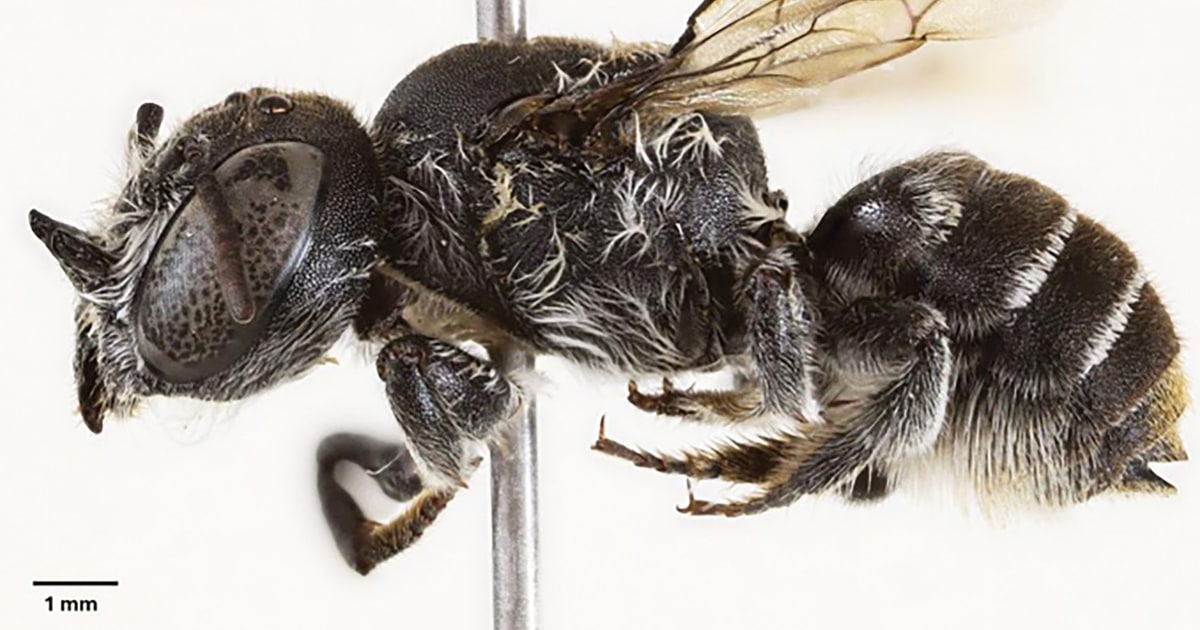Science
New Species of Bee Named ‘Lucifer’ Discovered in Australia

A newly identified species of native bee in Australia has been playfully dubbed “lucifer” due to its distinct, devil-like horns. The species, known scientifically as Megachile lucifer, was discovered during a survey of critically endangered wildflowers in Western Australia’s Goldfields in 2019. This finding was detailed in a study published on Monday in the Journal of Hymenoptera Research.
The female bees of this species exhibit unique upward-pointing horns measuring approximately 0.9 millimeters in length. These features likely aid in accessing flowers, competing for resources, and defending their nests, although the precise functions of the horns remain to be fully understood. Notably, male bees of the species do not possess these horns.
According to Kit Prendergast, the lead author of the study and an adjunct research fellow at Curtin University, the name “lucifer” was inspired by the popular Netflix series of the same name. Prendergast stated, “When writing up the new species description, I was watching the Netflix show Lucifer. The name just fit perfectly.”
DNA analysis confirmed that this species does not match any previously documented bees, marking it as the first new member of its group described in more than two decades. This discovery underscores the importance of studying native bees, which are currently at risk due to habitat disturbances and threats such as climate change.
Prendergast emphasized the urgency of understanding native bee populations, stating, “Without knowing which native bees exist and what plants they depend on, we risk losing both before we even realize they’re there.” Australia is home to around 2,000 native bee species, with more than 300 yet to be scientifically named and described, according to the CSIRO, Australia’s national science agency.
The conservation status of these native bees remains largely unknown. Tobias Smith, a bee researcher at the University of Queensland, highlighted this issue, noting that the country’s native bees are “understudied and data poor.” Smith, who was not involved in the study, expressed the need for “stronger policies” to protect these bees from habitat loss, inappropriate fire regimes, and the increased risks associated with megafires.
Smith also encouraged Australians to engage with their environment, saying, “Get outside and look for some native bees and appreciate them.” This call to action reflects the growing recognition of the critical role native bees play in ecosystems and the necessity for their conservation.
-

 Lifestyle4 months ago
Lifestyle4 months agoLibraries Challenge Rising E-Book Costs Amid Growing Demand
-

 Sports3 months ago
Sports3 months agoTyreek Hill Responds to Tua Tagovailoa’s Comments on Team Dynamics
-

 Sports4 months ago
Sports4 months agoLiverpool Secures Agreement to Sign Young Striker Will Wright
-

 Lifestyle4 months ago
Lifestyle4 months agoSave Your Split Tomatoes: Expert Tips for Gardeners
-

 Lifestyle3 months ago
Lifestyle3 months agoPrincess Beatrice’s Daughter Athena Joins Siblings at London Parade
-

 World3 months ago
World3 months agoWinter Storms Lash New South Wales with Snow, Flood Risks
-

 Science4 months ago
Science4 months agoTrump Administration Moves to Repeal Key Climate Regulation
-

 Science3 months ago
Science3 months agoSan Francisco Hosts Unique Contest to Identify “Performative Males”
-

 Business4 months ago
Business4 months agoSoFi Technologies Shares Slip 2% Following Insider Stock Sale
-

 Science4 months ago
Science4 months agoNew Tool Reveals Link Between Horse Coat Condition and Parasites
-

 Sports4 months ago
Sports4 months agoElon Musk Sculpture Travels From Utah to Yosemite National Park
-

 Science4 months ago
Science4 months agoNew Study Confirms Humans Transported Stonehenge Bluestones









